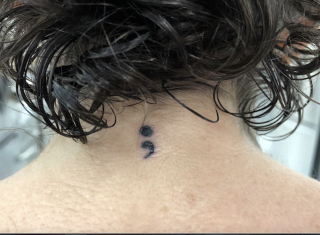Depression
Reflections for World Mental Health Day
Personal Perspective: Lessons from 4 decades of mental illness and recovery.
Posted October 10, 2023 Reviewed by Gary Drevitch
Today is World Mental Health Day and I’ve spend the weekend trying to figure out what to write. It’s been four decades since I first stepped foot in a therapist’s office and when I try to reflect, my brain ping-pongs all over the place. There’s so much data, too much to process.
I’m somewhat depressed now dealing with some medical conditions, one of which could potentially require surgery. Lots of testing and more testing. Waiting and more waiting. Feeling as though my health is spiraling out of control and not in a good way. One doctor’s appointment is not until February.

I get scared when I hear statistics like these, from a recent study: “Patients suffering from severe mental disorders, such as schizophrenia, major depression and bipolar disorders, have a reduced life expectancy compared to the general population of up to 10–25 years.” In the back of my mind is the realization I’ve entered the decade in which my mother passed away. She smoked four packs of cigarettes a day, she was overweight, but I badly abused my body with the anorexia, severe malnutrition, and laxative abuse. I will heave a big sigh when I turn 68, as she passed away at 67.
I’ve always maintained that emotional pain hurts worse than physical pain ever did or could. I still feel that way. I never want to go back to that dark place where I loathed myself so intensely I attempted to take my life, four times. Anorexia. Major depressive disorder with psychotic feature. Borderline personality disorder (BPD). In my late twenties, those three diagnoses changed my life, coloring my world with an intensity I’ve never known and will never know again.
In 1990, there was no internet, no convenient way to research what the psychiatrists pronounced as my prognosis: “Poor.” Stigma was rampant back then especially with patients diagnosed with BPD. An article in Time magazine from January 2009 stated “Borderlines are the patients psychologists fear most…Many therapists have no clue how to treat borderlines.”
I've had over 20 psychiatric hospitalizations, spent three years living in a halfway house, had multiple admissions to partial hospitalization programs and intensive outpatient programs, and thousands of individual therapy sessions. If I had to guess how much was spent on my treatment, it has been easily $1 million, and likely more.

In 2019, I finally let myself get the semicolon tattoo seen at left. I put it on the nape of my neck, so it’s not obviously visible; I was still working in a corporate environment. The semicolon tattoo is used as a message of affirmation and solidarity with those who have dealt with suicide, depression, addiction, or other mental health issues.
When the pandemic tore through the world, rates of anxiety and depression soared. In the first year of the COVID-19 surge, global prevalence of anxiety and depression increased by an estimated 25 percent, according to the World Health Organization (WHO).
The stigma that surrounded mental illness decreased, though, as more people reached out for help. Telehealth became an acceptable medium for psychotherapy. Even as the COVID emergency receded, telehealth proved to have staying power. One study showed that an internet-based intervention for depression can be equally beneficial as traditional face-to-face therapy.
I hope that stigma continues to decrease and that the accessibility to therapy that has been made possible through telehealth continues to increase. And I hope that my own physical health and emotional health evens out.
If you or someone you love is contemplating suicide, seek help immediately. For help 24/7 dial 988 for the National Suicide Prevention Lifeline, or reach out to the Crisis Text Line by texting TALK to 741741. To find a therapist near you, visit the Psychology Today Therapy Directory.


